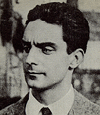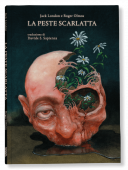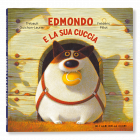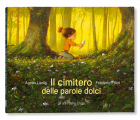CALVINO ITALO

Italo Calvino
(Santiago de las Vegas, Cuba 1923 - Siena 1985)
Italo Calvino was born in Cuba in 1923 (his parents worked as botanists there), but soon after his birth, they returned to Italy and settled in Sanremo. During World War II he had an active role in the Italian Resistance, the movement of the freedom fighters. In 1944 he joined the Italian Communist Party, which he left in 1957.
At the end of the war, he went to live in Turin, where he graduated in Literature with a thesis on Joseph Conrad, and started working for the publishing house Einaudi; here, he made friends with Cesare Pavese and Elio Vittorini. His first novel was published in 1947 The Path to the Nest of Spiders : it is the history of the experience with the Resistance in Liguria, seen through the eyes of a child, Pin.
From the neorealistic modules of his first novel, he moved on to a transfiguration of reality with paradoxical and bitter allegories of society and human condition. In the trilogy Nostri antenati, which includes The Cloven Viscount (1952), The Baron in the Trees (1957) and The Nonexistent Knight (1959), Calvino starts a new literary style, where the fairy-tale and the fantastic elements prevail.
The shifting between the reality of experience and a wild fantasy is also confirmed in a collection of realistic stories Ultimo viene il corvo (1949), in a narrative path which continued with La speculazione edilizia and The Watcher (1963).
In 1956 Calvino completed the collection of Italian Folktales. At the end of 1959, Calvino visited the United States, where he remained for 6 months, and was particularly impressed by the city of New York. In 1962 he met Esther Judith Singer (an Argentinian translator who worked for international agencies): they married in 1964. In 1967 Calvino moved to Paris, where he lived, often commuting to Italy, for the next fifteen years. While there he joined the Oulipo.
Among his works: Marcovaldo (1963), Cosmicomics (1965), Invisible Cities (1972, The Castle of Crossed Destinies (1973), If on a winter's night a traveler (1979), Palomar (1983).
Calvino was extremely popular not only in Italy and was also appreciated as a literary critic: his most famous and acclaimed interventions are Six Memos for the Next Millennium . Calvino also wrote for all his life as a commentator for different newspapers, such as "L'Unità" and "la Repubblica". He died in Siena, following a cerebral hemorrhage, during the early hours of 19th of September.
(Santiago de las Vegas, Cuba 1923 - Siena 1985)
Italo Calvino was born in Cuba in 1923 (his parents worked as botanists there), but soon after his birth, they returned to Italy and settled in Sanremo. During World War II he had an active role in the Italian Resistance, the movement of the freedom fighters. In 1944 he joined the Italian Communist Party, which he left in 1957.
At the end of the war, he went to live in Turin, where he graduated in Literature with a thesis on Joseph Conrad, and started working for the publishing house Einaudi; here, he made friends with Cesare Pavese and Elio Vittorini. His first novel was published in 1947 The Path to the Nest of Spiders : it is the history of the experience with the Resistance in Liguria, seen through the eyes of a child, Pin.
From the neorealistic modules of his first novel, he moved on to a transfiguration of reality with paradoxical and bitter allegories of society and human condition. In the trilogy Nostri antenati, which includes The Cloven Viscount (1952), The Baron in the Trees (1957) and The Nonexistent Knight (1959), Calvino starts a new literary style, where the fairy-tale and the fantastic elements prevail.
The shifting between the reality of experience and a wild fantasy is also confirmed in a collection of realistic stories Ultimo viene il corvo (1949), in a narrative path which continued with La speculazione edilizia and The Watcher (1963).
In 1956 Calvino completed the collection of Italian Folktales. At the end of 1959, Calvino visited the United States, where he remained for 6 months, and was particularly impressed by the city of New York. In 1962 he met Esther Judith Singer (an Argentinian translator who worked for international agencies): they married in 1964. In 1967 Calvino moved to Paris, where he lived, often commuting to Italy, for the next fifteen years. While there he joined the Oulipo.
Among his works: Marcovaldo (1963), Cosmicomics (1965), Invisible Cities (1972, The Castle of Crossed Destinies (1973), If on a winter's night a traveler (1979), Palomar (1983).
Calvino was extremely popular not only in Italy and was also appreciated as a literary critic: his most famous and acclaimed interventions are Six Memos for the Next Millennium . Calvino also wrote for all his life as a commentator for different newspapers, such as "L'Unità" and "la Repubblica". He died in Siena, following a cerebral hemorrhage, during the early hours of 19th of September.
links: - In Calvino Veritas - Calvino, l'ironique amusé - Professor Pajares' Italo Calvino page - Numbers in the dark: Calvino Net Community |






